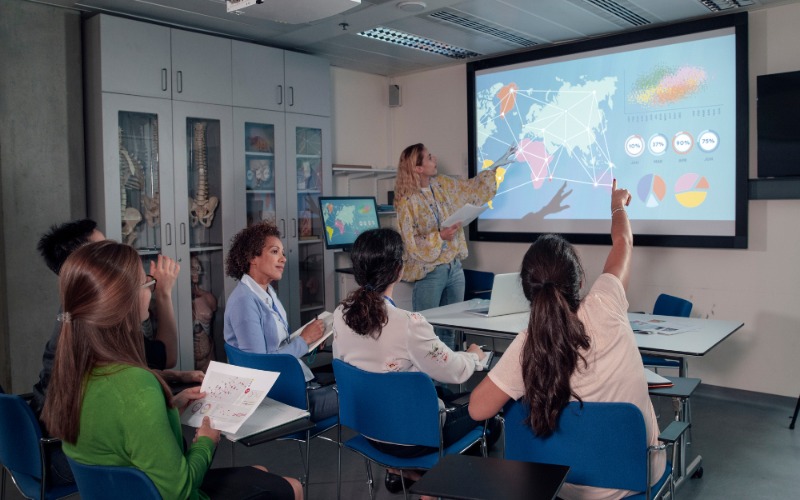Education has always been the cornerstone of our society. From traditional chalk-and-board classrooms to interactive digital learning environments, it has constantly evolved to meet the changing needs of learners. Research shows that 96% of educators agree that technology has a positive effect on students’ learning. Acknowledging the importance of incorporating cutting-edge tools in education, we find ourselves at the intersection of possibility and necessity.
Today, educational institutions worldwide are not merely adapting but thriving by embracing the transformative power of Smart School Management Tools. These innovative solutions are revolutionizing the learning environment. School Management Tools go beyond the traditional confines of administration; they are the architects of a holistic educational experience. Such tools seamlessly integrate with the educational ecosystem, offering a user-friendly interface for administrators, educators, and students alike.
Understanding Smart School Management Tools
School Management Tools represent the nexus where technology and education converge. At their core, these tools are comprehensive platforms that optimize the management of educational institutions. They serve as a centralized hub for tasks from attendance tracking to resource allocation. What sets them apart is their ability to transcend the mundane aspects of administration, actively contributing to a collaborative and efficient educational ecosystem.
Beyond their role in administrative efficiency, Smart School Management Tools serve as bridges connecting administrators, educators, students, and parents, facilitating seamless communication and information exchange. Equally important is their capacity to cultivate a student-centric environment, wherein personalized learning experiences become the norm rather than the exception. These systems are not just a technological marvel but a transformative force that propels education into an era of efficiency and innovation.

The Impact on Teaching and Learning
1. Empowering Educators with Insight: Smart School Management Tools provide educators with real-time data and analytics, empowering them to make informed decisions about their teaching strategies. This data-driven approach allows for personalized instruction tailored to individual student needs.
2. Streamlining Administrative Tasks: By automating administrative processes such as attendance tracking, grade recording, and resource allocation, the tools free up valuable time for educators. This streamlined approach enables teachers to focus more on actual teaching, hence creating a more efficient and productive teaching environment.
3. Collaborative Learning Environments: School Management tools facilitate seamless communication and collaboration among educators, students, and parents. This interconnectedness breaks down communication barriers and promotes a collaborative learning environment. Teachers can share best practices, and students can engage in group projects and discussions.
4. Enhancing Student Engagement through Technology: The integration of technology in education, facilitated by School Management tools, enhances student engagement. Interactive learning modules, multimedia resources, and online assessments make the learning experience more dynamic and captivating. Now, all learning styles and preferences are catered for.
5. Encouraging Active Student Participation: School Management Systems promote active student participation by providing platforms for interactive learning. Features such as online forums, virtual classrooms, and instant messaging create avenues for students to actively engage with course materials, ask questions, and collaborate with peers. This promotes a sense of participation and community.
Harnessing the Power of Data
By actively collecting and analyzing data on student performance, attendance, and engagement, School Management technologies provide invaluable insights that can empower decision-makers. One striking illustration of the School Management System in action is its ability to identify areas of improvement within the educational ecosystem. Through robust data analytics, schools can pinpoint specific challenges students may face. This personalized approach doesn’t just stop at remediation; it extends to the very core of the learning experience.
Each student can now receive the support they require to thrive academically. Equally important is the role data plays in crafting personalized learning experiences. These tools utilize data to discern students’ strengths, weaknesses, and learning preferences. Armed with this information, educators can design customized lesson plans, optimizing engagement and comprehension. This data-driven personalization creates an environment where students feel seen and supported. Moreover, schools can confidently allocate resources, streamline processes, and implement targeted interventions. This strategic decision-making improves operational efficiency and directly impacts the quality of education delivered.
Classter Solution in Action
Classter stands out as a prominent provider of Smart School Management Tools, reshaping educational landscapes globally. At the core of Classter’s impact is its commitment to enhancing learning outcomes through innovative solutions that streamline administration and operations. One remarkable feature is the platform’s adaptability and customization. This allows educational institutions to tailor the system to their specific needs. Classter has left an indelible mark on institutions across 35+ countries, becoming the bedrock of efficiency for schools, colleges, seminaries, and training centers alike. Moreover, the platform catalyzes operational unity, replacing fragmented IT infrastructures with a fully integrated solution. Integrating over 40 popular third-party tools provides a seamless experience for educational institutions. Classter exemplifies the marriage of innovation and education, setting a precedent for the future of Smart School Management Tools.
Future Trends of Education
Anticipating the increasing demands for streamlined administration and improved educational outcomes, the next wave of School Management tools will go beyond management tools. Instead, they will evolve into comprehensive ecosystems integrating cutting-edge technologies to create an immersive and dynamic learning experience. One key future trend lies in the seamless integration of Artificial Intelligence (AI) and Machine Learning (ML) algorithms into management tools. Through its intelligent systems, such innovations can significantly enhance the adaptability of teaching methods, ensuring that no student is left behind. Future Smart School Management Systems will leverage these immersive technologies to create virtual classrooms and interactive learning environments. Students will have the opportunity to explore historical events, dissect complex biological structures, or even collaborate on projects in a simulated space, transcending the limitations of traditional classrooms. In conclusion, the future outlook of education is driven by innovation, personalization, and active engagement.











